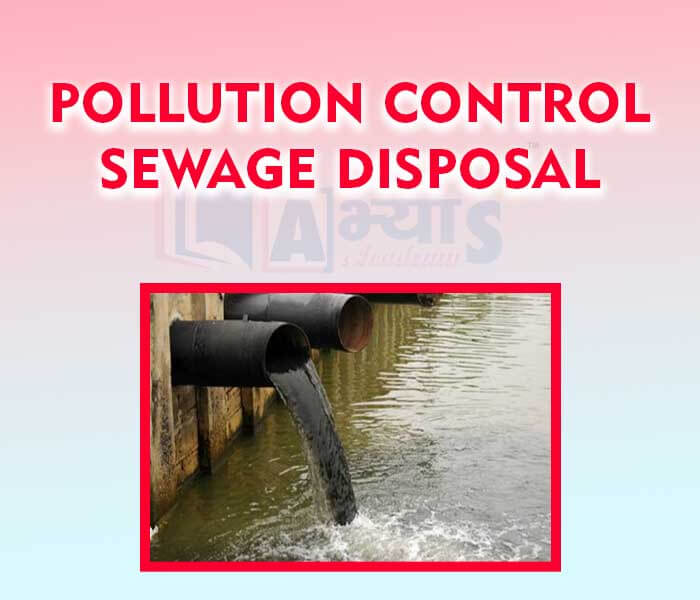Pollution Control Sewage Disposal





Pollution Control Sewage Disposal
1. Untreated sewage disposal pollutes water the most. The sewage should be treated to free it from harmful material before discharging into the water bodies. Sewage treatment plants are made for this purpose where sewage is stored in large tanks for some time. Air is passed through it. Harmful compounds are oxidized into harmless substances. After completing the process, tap water can be flushed into rivers and can be used for irrigation, the settled solid wastes form good manure.
Steps for the Treatment of Sewage:
2. Waste water generated from factories should be disposed off only after due treatment.
Dispose of Toxic Chemicals Properly :
Household solvents, pesticides, and cleaners might not seem that bad. But, bleach, paint, paint thinner, ammonia, and many chemicals are becoming a serious problem. If you combine millions of people every month dumping toxic chemicals down the drain or flushing them down the toilet, the effects add up. This is why proper disposal is important.
Many household chemicals can be recycled. Your community may have a recycling center that can take the old paint, used motor oil, and other chemicals and recycle them. Community collection centers and drop-off sites also exist in some areas. Your community may even have a hazardous waste collection day where those toxic old chemicals can be dropped off for safe disposal.
Do Not Pour Fat and Grease Down the Drain :
Grease, fat, and used cooking oil should be disposed of in the trash or kept in a “fat jar” for disposal with other solid waste. Your pipes might clog and cause sewer pipes to clog and back up into yards and basements. The waste also contaminates local bodies of water.
Use Phosphate-Free Detergent and Dish Cleaner :
You can further cut down on water pollution by using just enough of these cleaners to do the job. Phosphates aren’t the only harmful chemicals in cleaners. Phosphates lead to algae blooms and kill fish and other aquatic animals by reducing the oxygen in the water.
Dispose of Medical Waste Properly :
Never flush medicines down the toilet, and never dump them in the nearest pond or creek. The drugs tend to accumulate in the water, and in fish and other wildlife. Hormones and other compounds end up causing a variety of health problems in fish and birds and contaminate drinking water that people and livestock use.
Try to Avoid Plastic Containers :
Plastic shopping bags and plastic rings from six-packs of beverages cause inordinate problems in the nations lakes and seas. Plastic bottles can last for decades in the water. Buy some reusable cloth or plastic grocery bags instead. Use reusable, insulated containers to hold drinks and make your own filtered water at home.
Plant Some Trees :
Trees reduce erosion that washes pollution into the water and reduces erosion.
________________________ should be disposed of in the trash or kept in a “fat jar” for disposal with other solid waste. | |||
| Right Option : D | |||
| View Explanation | |||
Sewage treatment plants are made for this purpose where sewage is stored in ___________________ for some time. | |||
| Right Option : A | |||
| View Explanation | |||
Which of the following are correct : (a) Sewage treatment plants are made for this purpose where sewage is stored in large tanks for some time. (b) In sewage treatment plants, heavier particles settle down and the water flowing down is relatively pure. (c) Waste water generated from factories should be disposed off only after due treatment. | |||
| Right Option : D | |||
| View Explanation | |||
Students / Parents Reviews [10]
It has a great methodology. Students here can get analysis to their test quickly.We can learn easily through PPTs and the testing methods are good. We know that where we have to practice

Barkha Arora
10thAbhyas is a complete education Institute. Here extreme care is taken by teacher with the help of regular exam. Extra classes also conducted by the institute, if the student is weak.

Om Umang
10thAbout Abhyas metholodology the teachers are very nice and hardworking toward students.The Centre Head Mrs Anu Sethi is also a brilliant teacher.Abhyas has taught me how to overcome problems and has always taken my doubts and suppoeted me.

Shreya Shrivastava
8thOne of the best institutes to develope a child interest in studies.Provides SST and English knowledge also unlike other institutes. Teachers are co operative and friendly online tests andPPT develope practical knowledge also.

Aman Kumar Shrivastava
10thIt was good as the experience because as we had come here we had been improved in a such envirnment created here.Extra is taught which is beneficial for future.

Eshan Arora
8thMy experience was very good with Abhyas academy. I am studying here from 6th class and I am satisfied by its results in my life. I improved a lot here ahead of school syllabus.

Ayan Ghosh
8thBeing a parent, I saw my daughter improvement in her studies by seeing a good result in all day to day compititive exam TMO, NSO, IEO etc and as well as studies. I have got a fruitful result from my daughter.

Prisha Gupta
8thAbhyas Methodology is very good. It is based on according to student and each child manages accordingly to its properly. Methodology has improved the abilities of students to shine them in future.

Manish Kumar
10thMy experience with Abhyas academy is very good. I did not think that my every subject coming here will be so strong. The main thing is that the online tests had made me learn here more things.

Hiya Gupta
8thA marvelous experience with Abhyas. I am glad to share that my ward has achieved more than enough at the Ambala ABHYAS centre. Years have passed on and more and more he has gained. May the centre flourish and develop day by day by the grace of God.
